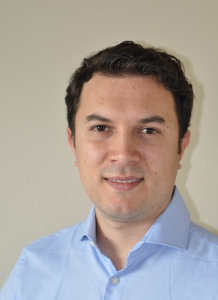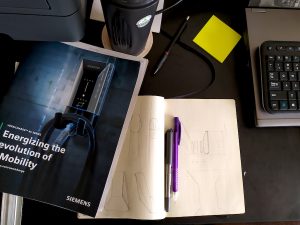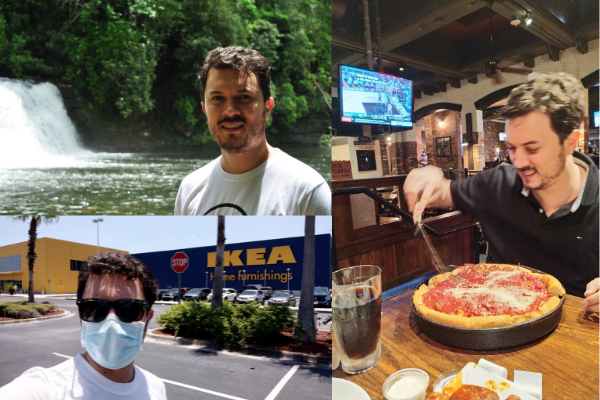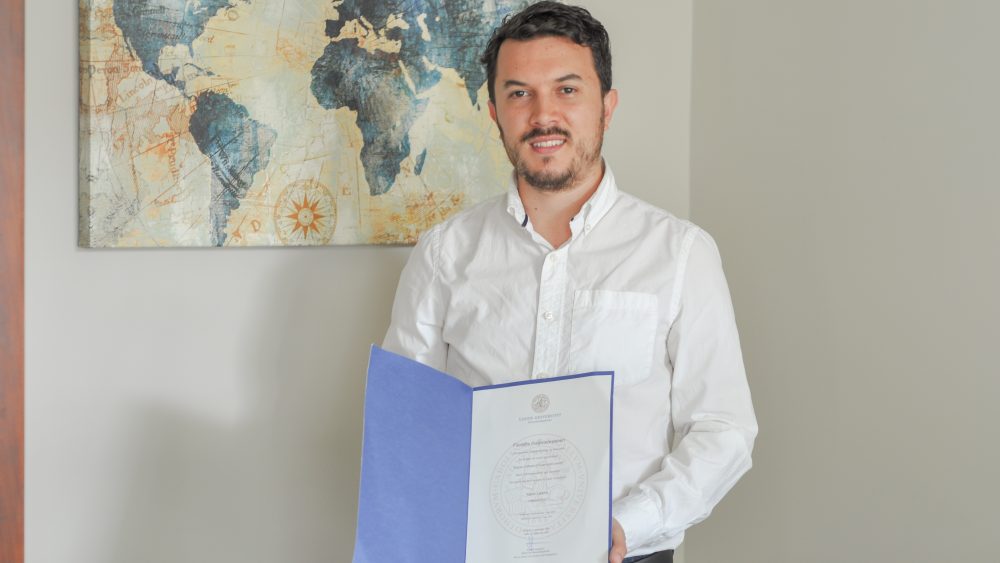In this week’s blog portrait we meet Kevin Latorre, alumnus from the Entrepreneurship programme 2020 at the School of Economics and Management, who has just landed a new job as a designer at Siemens in the US.
 Hi Kevin! What have you been up to since your graduation?
Hi Kevin! What have you been up to since your graduation?
By the time of my graduation, the pandemic was just starting and that changed my plans in Sweden. At that time I had to fly back home before I expected and finish a project for a client. While being at home I went straight ahead to look for a new job, which turned out to be not so easy. I took the free time and the lockdown to catch up with pending readings while doing online courses and re-structuring my CV.
I took some time off to travel and spend time at the beach with the family. That time was difficult with all the lockdowns and the overall mood of the society all over the world. After some time improving my portfolio, my resumé and asking for help, I found a position in the US for the local government in Florida, where I worked in a division related to economic development initiatives and, new ventures in the region. It was interesting to see all the effort that governments put to control the pandemic and at the same time lift back the economies where the role of innovation in those initiatives was crucial.
You recently started working as a designer at Siemens in the US, can you tell us a bit more about your everyday work routine?
Yes, that came to me at the right time after looking for different positions in other similar companies. I started just a month ago and I am in a business unit that has a general objective to accelerate the adoption of electric mobility in North America, so my every day varies between meetings with different team members in the company, as well as design work to produce different deliverables.
The core of my role aims to be at the front end of product innovation, sometimes I must wear different hats to support other teams or simply because I have a personal interest in it. For example, an opportunity that I saw early, was trying to help with the implementation of the new Siemens branding in our unit across different applications such as web, print, exhibition, and others. For a global brand like Siemens, it is important to adjust those changes to the specific markets, in this case for North America. By understanding a global Design system as well as the particularities of the local market, I can bring a perspective to bridge in a balanced way the requirements of different stakeholders.
Like in many jobs, each day brings me its own rush and scope, especially in the historic moment that the energy sector currently is going through and the push that EV technologies are making it into the market. One week I could be working entirely in concept design or idea generation, the next week could be focused on user experience and another week could be making product visualizations for marketing materials. Overall, I do like all the different design deliverables. Variety is a constant in this role that keeps me interested and exposed to different tasks, teams, and knowledge within the organization.
What are your biggest lessons and insights from working for almost a decade with design and innovation?

My Design experience journey sounds extensive but, is mainly because I was lucky to freely decide, pick and start early on this career path. I had the opportunity to participate on impactful industrial design projects in manufacturing facilities when I had just graduated from my bachelors. That kind of learning from being in contact with manufacturers opened up my imagination and interest in different applications of design very early, as well as being able to take internships while I was finishing my studies. That allowed me to stay focused despite the non-linear directions that sometimes life takes. I always tried to maintain a mindset of constant learning and improvement which I still try to keep.
After some years practicing design, analyzing the theory behind it, and being exposed to different opinions about design; it is interesting that design still has a long way to be understood and get adopted in many settings where it is needed.
As a good Latin-American teacher once said Design is not necessary, but inevitable. Before drawings, Design is about making decisions. “Designare”, is a mental plan to designate, however, design practice should not be mistaken only as a thinking process, it requires action with different implications, so it comes with different grades of responsibility. The action of designing something may not be for everybody. Depending on the expected outcome or approach, it demands specific skills, rigor, dedication, rational and intuitive decisions based on knowledge, all this happening on different timelines. It is fun, but complex.
How has your time as a student at Lund University influenced your life?
It was life-changing and challenging. In the beginning, it was hard for me to switch back to the academic world after years of being distanced. However, with some extra effort and the great resources that the university, the location, and the ecosystem around it, I managed to adapt.
For me to have the opportunity to stop my working life, dedicate time to the topics I was curious about was priceless. The content that I was able to read from the masters was valuable to add a complementary layer of knowledge and make life-changing career and financial decisions. I now can make connections between the economics of innovation and design, which for me add extra resources for the analysis of any business or design case. On the other hand, to be exposed to such a diverse group of people from different parts of the world, was insightful for the purpose of understanding different points of view which in one way or another shaped me as a person.
I also made some good friends that made my time in Lund more enjoyable, we still try to stay in touch. I got in touch with some professional contacts which I hope to keep with the intention of maintaining a valuable network and learn from each other.
What do you do to seek inspiration, both for work and in your free time?

I am curious about many things: people, cultures, products, organizations… but, travels are my main source of inspiration. I like to read and listen to different podcasts, but more recently into audiobooks when I have time to spare. At the same time, I would say that shooting pictures with any kind of camera is always a good way for me to get inspiration, as well as hiking or walking by the beach.

